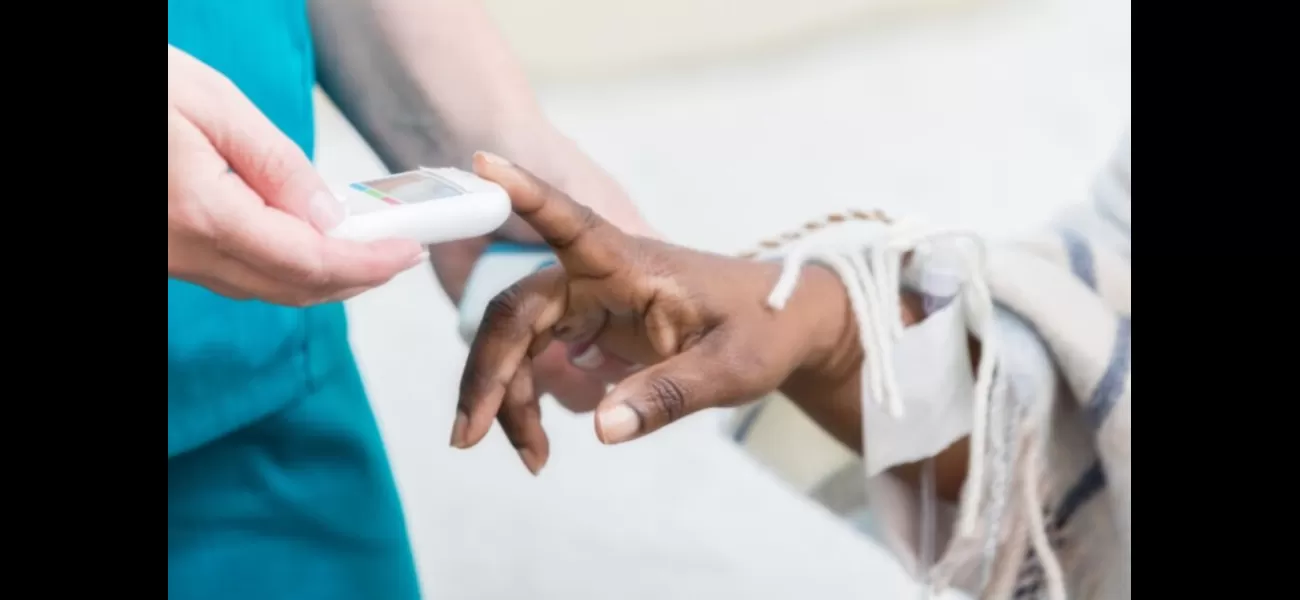CDC provides diabetes support for Black women with type 2 diabetes through "Your Diabetes Compass."
The CDC created a site specifically for Black women.
June 13th 2024.

The Centers for Disease Control and Prevention understands the unique challenges faced by Black women with type 2 diabetes. With statistics showing that 1 in 4 Black women over the age of 55 are living with this chronic disease, the CDC has created an innovative tool called Your Diabetes Compass to provide invaluable resources and support for managing this journey. This website was specifically designed with the needs of Black women in mind, recognizing the disproportionately high rates of type 2 diabetes in this community and their low participation in personalized support services.
Your Diabetes Compass welcomes Black women to create customized guides by taking a quick self-assessment. This will recommend resources tailored to their specific needs. The website also offers a variety of diabetes support topics to explore.
One of the topics covered on the website is Monitoring Diabetes. The CDC states that while not everything is within our control, monitoring can greatly help in managing diabetes. Black women can access tools and information to keep track of their blood sugar, A1C levels, eating habits, blood pressure, and cholesterol. The Monitoring Diabetes page also offers resources for stress management and overcoming challenges, such as Continuous Glucose Monitors. Additionally, there is a blood sugar monitor log available for download directly from the website.
The Reducing the Risk of Complications page acknowledges the stress that comes with living with diabetes, as it can also increase the risk of other health problems like heart disease, vision loss, and kidney disease. This page provides resources and information on ways to avoid these complications and maintain overall health. It covers topics such as regular checkups, foot and eye care, vaccinations, and practicing healthy habits. The CDC has even created a Healthy Checkup Checklist to help keep track of appointments and check-ins.
The Creative Eating and Cooking page addresses the common concern of what to eat and what to limit when living with diabetes. The CDC reassures that while what we eat has a big impact on managing the disease, it doesn't mean the end of delicious and satisfying food. This page offers tips on making healthy dishes, covering diet topics like carbs, proteins, and fats. It also recommends meals, eating goals, and portion sizes, as well as providing tips on grocery shopping and eating while traveling.
Physical activity is an essential part of managing blood sugar, and the Increasing Physical Activity page reminds Black women living with diabetes of this. This page is dedicated to making small changes in daily routines to increase physical activity and feel healthier and more energized. It explains the benefits of being physically active and offers advice on starting safely and keeping fitness routines fun and convenient. Additionally, this page provides haircare and workout resources for Black women.
Quality care is crucial for managing diabetes, and the CDC has created a page called Getting Quality Care to help ensure that Black women receive the best care possible. This page includes a series of questions that can help individuals connect with primary care providers and other diabetes specialists who are vital to their journey. It also provides links to connect with Black doctors and culturally-aware medical professionals and offers resources to help prepare for medical visits effectively.
The Finding the Right Provider page helps Black women assess their current healthcare providers and find ones that are suitable for their specific needs. It guides visitors through insurance coverage recommendations and provides questions to ask during medical visits. It also offers steps for preparing before meeting with a healthcare provider, and online search tools such as the Association of Diabetes Care & Education Specialists and the American Diabetes Association can assist in finding local education programs.
The feeling of community is essential in managing diabetes, and the CDC's Community Support page acknowledges this. It states that having a sense of community is one of the best ways to predict how well someone will manage their diabetes, as having help from family, friends, and others can reduce health risks. This page provides various ways for individuals to find support, including peer support groups and communities of people managing chronic diseases. It also extends information to family and friends who want to learn how to be more helpful.
On the Living With Diabetes page, individuals can explore common mental health outcomes associated with stress and diabetes, such as anxiety, depression, and diabetes burnout. A chart is available to help identify and understand stress-related symptoms, and self-care tips are provided as a resource for managing stress levels and lowering the risk of illness. This page also allows individuals to click through different topics like the body, mind, and spirit, as they practice self-care as part of their diabetes plan.
Through the Your Diabetes Compass website, Black women have access to diabetes self-management education and support services. These services connect them with trained specialists who can provide guidance, attentive listening, and continuous support in navigating daily self-care. According to the CDC, research has shown that diabetes education helps lower blood sugar, blood pressure, and cholesterol levels, enhancing overall well-being and reducing the likelihood of developing diabetes-related complications.
The CDC also has a YouTube channel that offers an overview of the Your Diabetes Compass tool specifically for Black women living with diabetes. This initiative is part of the CDC's ongoing efforts to raise awareness and educate the public about prediabetes. In 2016, they partnered with the Ad Council, American Diabetes Association, and American Medical Association to launch the "Do I Have Prediabetes?" campaign. This campaign's messages are strategically designed to reach all U.S. adults aged 40 to 65, with a focus on communities most impacted by the chronic condition.
In an interview, Sherri Shepherd, who also lives with diabetes, shared her experience and journey with the disease. She emphasized the importance of taking care of one's health and the need for support and education for those living with diabetes. With the Your Diabetes Compass website, the CDC is providing Black women with a valuable resource to help them manage their diabetes and lead healthier lives.
Your Diabetes Compass welcomes Black women to create customized guides by taking a quick self-assessment. This will recommend resources tailored to their specific needs. The website also offers a variety of diabetes support topics to explore.
One of the topics covered on the website is Monitoring Diabetes. The CDC states that while not everything is within our control, monitoring can greatly help in managing diabetes. Black women can access tools and information to keep track of their blood sugar, A1C levels, eating habits, blood pressure, and cholesterol. The Monitoring Diabetes page also offers resources for stress management and overcoming challenges, such as Continuous Glucose Monitors. Additionally, there is a blood sugar monitor log available for download directly from the website.
The Reducing the Risk of Complications page acknowledges the stress that comes with living with diabetes, as it can also increase the risk of other health problems like heart disease, vision loss, and kidney disease. This page provides resources and information on ways to avoid these complications and maintain overall health. It covers topics such as regular checkups, foot and eye care, vaccinations, and practicing healthy habits. The CDC has even created a Healthy Checkup Checklist to help keep track of appointments and check-ins.
The Creative Eating and Cooking page addresses the common concern of what to eat and what to limit when living with diabetes. The CDC reassures that while what we eat has a big impact on managing the disease, it doesn't mean the end of delicious and satisfying food. This page offers tips on making healthy dishes, covering diet topics like carbs, proteins, and fats. It also recommends meals, eating goals, and portion sizes, as well as providing tips on grocery shopping and eating while traveling.
Physical activity is an essential part of managing blood sugar, and the Increasing Physical Activity page reminds Black women living with diabetes of this. This page is dedicated to making small changes in daily routines to increase physical activity and feel healthier and more energized. It explains the benefits of being physically active and offers advice on starting safely and keeping fitness routines fun and convenient. Additionally, this page provides haircare and workout resources for Black women.
Quality care is crucial for managing diabetes, and the CDC has created a page called Getting Quality Care to help ensure that Black women receive the best care possible. This page includes a series of questions that can help individuals connect with primary care providers and other diabetes specialists who are vital to their journey. It also provides links to connect with Black doctors and culturally-aware medical professionals and offers resources to help prepare for medical visits effectively.
The Finding the Right Provider page helps Black women assess their current healthcare providers and find ones that are suitable for their specific needs. It guides visitors through insurance coverage recommendations and provides questions to ask during medical visits. It also offers steps for preparing before meeting with a healthcare provider, and online search tools such as the Association of Diabetes Care & Education Specialists and the American Diabetes Association can assist in finding local education programs.
The feeling of community is essential in managing diabetes, and the CDC's Community Support page acknowledges this. It states that having a sense of community is one of the best ways to predict how well someone will manage their diabetes, as having help from family, friends, and others can reduce health risks. This page provides various ways for individuals to find support, including peer support groups and communities of people managing chronic diseases. It also extends information to family and friends who want to learn how to be more helpful.
On the Living With Diabetes page, individuals can explore common mental health outcomes associated with stress and diabetes, such as anxiety, depression, and diabetes burnout. A chart is available to help identify and understand stress-related symptoms, and self-care tips are provided as a resource for managing stress levels and lowering the risk of illness. This page also allows individuals to click through different topics like the body, mind, and spirit, as they practice self-care as part of their diabetes plan.
Through the Your Diabetes Compass website, Black women have access to diabetes self-management education and support services. These services connect them with trained specialists who can provide guidance, attentive listening, and continuous support in navigating daily self-care. According to the CDC, research has shown that diabetes education helps lower blood sugar, blood pressure, and cholesterol levels, enhancing overall well-being and reducing the likelihood of developing diabetes-related complications.
The CDC also has a YouTube channel that offers an overview of the Your Diabetes Compass tool specifically for Black women living with diabetes. This initiative is part of the CDC's ongoing efforts to raise awareness and educate the public about prediabetes. In 2016, they partnered with the Ad Council, American Diabetes Association, and American Medical Association to launch the "Do I Have Prediabetes?" campaign. This campaign's messages are strategically designed to reach all U.S. adults aged 40 to 65, with a focus on communities most impacted by the chronic condition.
In an interview, Sherri Shepherd, who also lives with diabetes, shared her experience and journey with the disease. She emphasized the importance of taking care of one's health and the need for support and education for those living with diabetes. With the Your Diabetes Compass website, the CDC is providing Black women with a valuable resource to help them manage their diabetes and lead healthier lives.
[This article has been trending online recently and has been generated with AI. Your feed is customized.]
[Generative AI is experimental.]
0
0
Submit Comment





